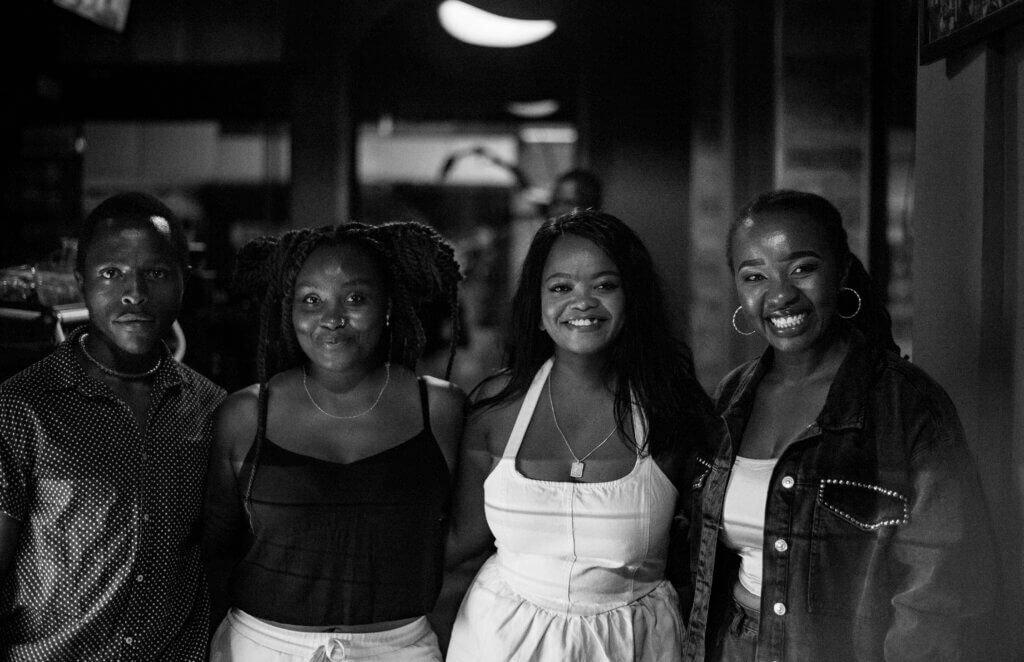Nice Githinji remembers exactly how it felt watching movies in an open field with a crowd as a child growing up in Makongeni, Mombasa. She describes it with the same nostalgia as one would their first love or the first time they tasted their favourite food or read their favourite book. Called sinema za kamero, these were mobile cinemas where a truck, van or a lorry fitted with projection equipment would screen films in communities where formal cinemas were rare, a concept that has since faded away, sadly, in a country with less than 20 cinemas.
“At around 7 or 8pm, we would go to the field, sit together and watch movies. The kids would sit at the front while the adults stood at the back. Some people brought stools from their houses. It was a communal affair,” Githinji recalls.
She likens the experience to Kenya’s oral traditions. “We would sit around a fire, our grandmothers would say one thing, and then we would repeat it. We were a very active audience and very communal.”
It’s this satisfying sense of community and shared joy that Githinji wants to capture with her new initiative Boma Film Nights. Launched in January 2025, the monthly screening event curated by Githinji is meant to celebrate the best of Kenyan cinema in a relaxed and engaging way.
“Boma” is a Swahili word meaning a homestead with one family or community. “The name reflects the heart of storytelling and community gathering,” Githinji says.
Held every last Thursday of every month at Café Amka and Ballpoint at Village Market, each edition of Boma is themed and features a mix of both old and new films, across different genres. January launched with a showcase of shorts from emerging filmmakers with titles such as Stero, These are the Moments to Die For, Mawimbi, DJ Break and Midnight Van – Githinji’s own directorial debut.
February explored love with 2024 romcom Boda Love and Foi Wambui-led short Morning After. In March, the spotlight was on female-led stories with Reuben Odanga’s 2022 drama Nafsi about a surrogacy arrangement that fractures a deep friendship, and Philit Productions’ Makosa ni Yangu about the dark realities of domestic violence. April brings a shift in tone as comedy takes centre stage.
It’s a very deliberate and well-thought curation, one that also aims to be bold beyond the confines of mainstream, like in the month of November where Boma will be celebrating Pride by showcasing LGBTQ-themed films.
Fittingly, Githinji’s second film as a director is a queer Kenyan story about a family coming to terms with the loss of their son. Titled Bikey, the project wrapped production recently and will be releasing this year.
It’s surprising that someone who remembers watching films so vividly as a young girl didn’t initially dream of acting, and that she stumbled on it by chance. “I wouldn’t say I fell in love with it,” Githinji says. Acting was no path for someone like her who didn’t come from a well-to-do family. She had planned to study law or international relations. “But then life happened.”
While still in high school, a friend, Anthony Rutabingwa, was part of a traveling theatre group that staged a play at her school. Curious, Githinji asked how to get involved and Rutabingwa connected her to David Kinyua, producer and founder of The Planets Theatre.
She was so determined to kickstart her acting career that the day she finished her last exam paper is etched in her memory. “It was November 9,” Githinji says. “The next month, I was at the Kenya National Theatre for a workshop and auditions. By January, I was on stage.”
She was 17 at the time, young, eager and with a talent to back it up. “I think I grew to fall in love with acting because it paid my bills. But then I just happened to be quite great at it, and it has been a beautiful relationship ever since.”

With a career spanning two decades, Githinji has worn many hats – actor, producer, director, event host, and curator. Most recently, she became an intimacy coordinator – a new field that has gained traction and relevance in many creative industries across the world in the wake of the #MeToo movement. For Kenya, a nascent industry still taking shape, intimacy coordination is still relatively unknown and underutilised, even in productions where there’s a need for it. In fact, it was only in 2024, that MultiChoice, through its academy outfit MultiChoice Talent Factory (in partnership with GIZ), hosted Kenya’s first ever intimacy coordination training.
Githinji came across intimacy coordination when she was doing her research on art therapy which she was considering as her retirement plan. “I figured that when I’m old and grey in my 60s, I’d be sitting by the beach in Mombasa on a laptop helping artists through their mental struggles because I understand our psyche as artists.”
She discovered IDC, a female-led platform that trains intimacy professionals for TV, film and theatre. “I became intrigued as I was reading their resources online and I subscribed to it,” Githinji says.
Like many in the industry, Githinji has found herself in “questionable” situations she once thought were safe at the time. “I’ve been active in the industry for a long time. I’ve played the siren, the sexy girl, the homewrecker, the slut, you know, all those raunchy female parts,” she says. “I’ve ended up in situations where I thought I had the power but I didn’t because as an actor, I didn’t really know my rights. I’ve taken my clothes off on stage during a play and I thought, ‘Oh, come on. I’m so bold. I’m great at this, and I can do this.’ But the older I got, the more I realised that as actors, we’re sometimes caught in situations where we don’t think that we can say no because we think that saying no means you’ll lose your job even if something goes against your values.”
The more she learned about intimacy coordination, the more it clicked. “I realised I wanted to do this.” And the universe listened.
Soon after, she got a chance to be part of the MultiChoice Talent Factory intimacy coordination training, led by South African producer and director Sarah Blecher, known for films like Ayanda and Otelo Burning. Blecher has since become Githinji’s mentor.
Githinji got her first practical experience on the short film Transaction, which premiered at IFFR 2025. “I got a good feel of it,” she says.
By the end of the year, she was serving as intimacy coordinator on Tuki? (Tukisonga), a young adult drama that navigates youth sexuality through the lens of three female leads with different personalities.
She also worked on the upcoming Kenyan season of MTV Shuga – MTV Shuga Mashariki – set to premiere in May, as the production’s intimacy coordinator.
“I love it, I love that it’s niche. And I love that I am an advocate for actors,” she says. “Intimacy coordination is very new in the world, but it’s even newer for Kenya. My hope is that sooner or later, it becomes the new normal because everyone’s mind, body and soul has to be protected on set, whether cast or crew.”
That local productions are now willing to adopt intimacy coordination is a triumph, and a much-needed step forward, despite the challenges that Githinji describes as “similar to any industry.” It’s a very different view from how she felt in her 20s.
“Some challenges are out of our hands but most are fixable, and that means unionising, which we are doing with organisations like the Kenya Actors Guild,” she says.
This progress might be at a snail’s pace but Githinji is optimistic. There are more women behind the camera than ever before, she says. “While on the set of Tuki, it was beautiful to turn around and see a female director, a female DOP, sound, female this and female that. I have nothing against men but it’s a beautiful space when I get to work with an all-female crew.” This was always her dream when she directed her first film Midnight Van in 2022.
Progress, she says, comes in many forms. Like the fact that these days, she’s busier than ever. When she shares her schedule for the week, there’s hardly any room to plan this interview. She’s filming on two sets concurrently. “I’m working on one international project, a really great project that I’m so excited to share once it’s ready. The other project is a local film with an international director which I’m excited to share as well.”
But it’s not just Githinji who’s busy. “I know for a fact that the industry is changing for the better. Almost everyone is busy at the moment. This has been unheard of in previous years,” she says.
Is she where she thought she’d be at this point in her career? It’s not a simple answer. “I don’t know if I’m exactly where I wanted to be, but I’m also sure if I was already there, then life would be a tad bit boring. Because what do you do when you have everything you want?” she asks.
To stress her point, she quotes a recent tweet by Kenyan music group Matata that has become her mantra: “An artist cannot be a success because success is the end. The moment you believe in it, you stop. You start chasing what worked before, living in the shadow of your own publicity. But art is a movement. It’s a risk. It’s a refusal to repeat. Stay unfinished, stay searching.”
Boma Film Nights is part of that for her, her need to constantly learn and evolve. “I love indulging in life, and sucking it all in like a sponge,” she says.
Githinji describes Boma as “the most Kenyan night” she has come across in a long time. “We’re not just screening Kenyan films, we’re also playing Kenyan music.”
In recent years, Kenya’s creative industry has seen a renewed interest from audiences – in Kenyan music, comedy and even theatre where outfits like Too Early for Birds have sold out large capacity auditoriums for four days straight. But film has struggled to catch up to this hype, with a few standout exceptions from players like Philit Productions who, in November 2024, did the unthinkable when they sold out a 6,000-seat premiere for their film Makosa ni Yangu.
Githinji believes initiatives like Boma are key to building the elusive cinema culture in Kenya by making more Kenyan films accessible to audiences. “We are yet to see the best films that Kenya has to offer,” she says. “There are filmmakers with incredible projects sitting on hard drives. There are films in all genres – horror, sci-fi, you name it – old films like Saikati, Malooned and Formula X, and more recent ones too.”
Kenya’s presence at global festivals has grown steadily over the years, with notable premieres at Toronto International Film Festival (TIFF) and Sundance. And while these festivals are important in validating a filmmaker’s work and offering the much-needed global exposure, the reality is that without a local distribution strategy, some of these films never make it back home. And when they do, the wait is sometimes too long before Kenyan audiences get to see them.
“It’s a sad reality for actors and filmmakers to have their work screening at international festivals while Kenyan audiences have no access to them,” Githinji says.
But for Githinji, it’s more than just about access. She understands first-hand what it means to struggle to make a living in an industry where budgets are constantly shrinking. Boma’s 50-50 revenue share model eliminates the middlemen while also being transparent, ensuring that filmmakers receive a fair share of profits from each screening. “At the end of the day, filmmakers need to make money. We can’t live gig to gig,” Githinji says. “Our model ensures that filmmakers and actors are seeing real returns every month.”

For its success, Githinji is banking on Boma’s unique formula – a blend of three worlds she knows best: bar culture, theatre and film.
“I’ve hosted karaoke in clubs since I was in my 20s. I understand our bar tendencies. We want to sit and be comfortable, but we also want to eat and drink,” she says. “This is why cinemas are a bit too stiff for us. This is why our concerts sell out because you can listen to music, dance and then walk away to a corner to chat to a friend without disrupting anything or missing much.”
Her background in theatre – through Shorts from Africa, co-founded with Nyokabi Macharia – has also shaped her approach. “All these things have taught me how best to curate the screening,” she says.
They sold out their first edition in January. A comment on Instagram after the March edition reads: “Best night ever, waiting for April’s adventure.”
It’s this kind of validation that Githinji is counting on to grow Boma because after all, the audience is king. “I’m putting it out in the universe,” she says.
Inspired by Mutua Matheka’s immersive 2024 showcase Fragments, Githinji hopes to bring science and technology into Boma’s future. “I want to add project mapping in these screenings so I can transport the audience to a film’s location, or even get to a point of watching films using VR. There are filmmakers who’ve made VR films but there are no spaces to screen their work,” she says.
She’s also thinking about long-term strategies like gathering audience data to understand emotional responses to films and share insights with streamers, policymakers, and other key decision-makers. “Can we use Boma Film Nights to understand how women feel after watching a violent film? How do men feel? Do comedies make Kenyans forget their problems? Do political films make Kenyans angrier? At the end of the day, I believe that if we understand the research and the science behind our industry, we can monetize in more ways than we can see,” she says.
Eventually, Githinji wants to take Boma beyond Nairobi, to the often over-looked and under-served audiences across Kenya. “I want to hold satellite film nights across the country and mostly within communities, because, again, we have the problem of lack of social halls and even theatre halls.”
Because sometimes, all it takes for an unforgettable film experience is a screen, a speaker and a field full of people gathered together at 8pm in Makongeni, Mombasa.
Enjoyed this article?
To receive the latest updates from Sinema Focus directly to your inbox, subscribe now.











